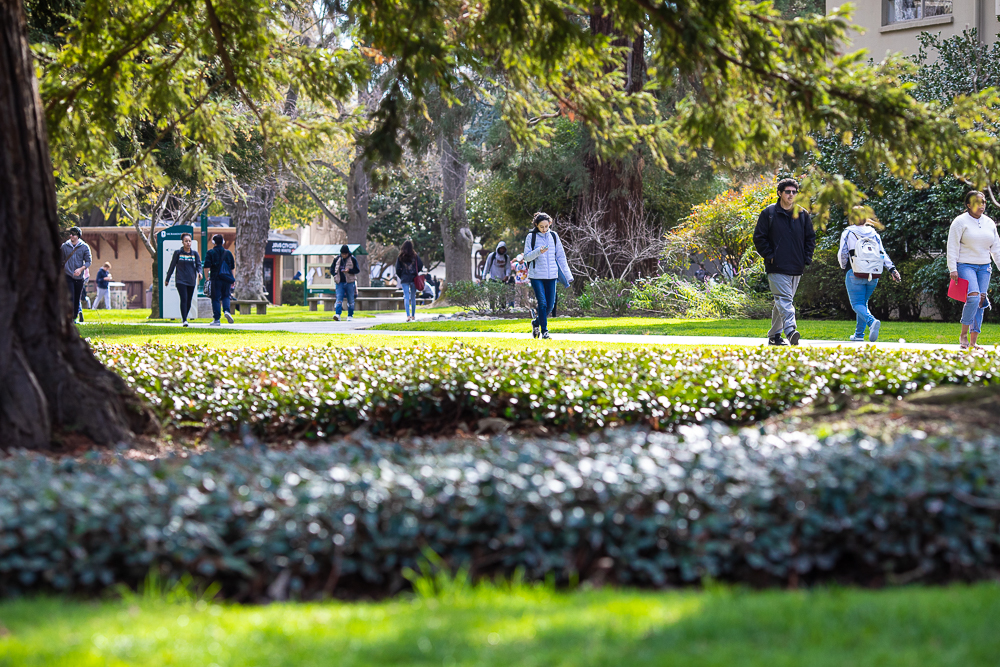 "First-gen" students, so-called because of their pioneering steps into higher education, are gaining further recognition at Sac State, where an honor society has been established on their behalf. (Sacramento State/Andrea Price)
"First-gen" students, so-called because of their pioneering steps into higher education, are gaining further recognition at Sac State, where an honor society has been established on their behalf. (Sacramento State/Andrea Price)
By Cynthia Hubert
Sacramento State is among the nation’s first universities to establish an honor society exclusively for first-generation students.
Alpha Alpha Alpha, or Tri-Alpha, was founded in 2018 by Moravian College in Pennsylvania. Its purpose is to recognize the strength and determination of first-generation students and contributions they make to their universities.
More than a third of Sac State students identify as “first gen,” meaning that neither of their parents earned a degree. They are considered pioneers and mentors to younger siblings and residents of their neighborhoods and communities.
Because of its commitment to and work on behalf of these students, Sac State was identified earlier this year as a First Generation Institution, part of an elite community of colleges that share knowledge, best practices and troubleshooting strategies meant to support students who are role models to their families but often feel lost and overwhelmed on campus.
Many of the students face cultural, financial and language barriers that impede their success. Among their challenges is a lack of knowledge about getting into college and navigating campus, and pressure from relatives who may rely on them to provide financial and other support, such as acting as translators, for their families.
Establishing a Tri-Alpha chapter represents a new way of honoring first-generation students and acknowledging their successes, said Chao Vang of Sac State’s Student Academic Success and Educational Equity Programs. Vang, who identifies as first-generation, will serve as inaugural president of Sac State’s chapter.
“Often, first-gen students don’t have the social capital to guide them to college and through college,” Vang said. “Many of them must depend on a sibling, a high school teacher, or a mentor to help them succeed.
“When they do, it has a ripple effect through their families, their friends, their neighborhoods and communities. It’s very important to recognize and validate the experiences of first-generation students and the challenges they face. They are to be commended.”
Marcellene Watson-Derbigny, associate vice president for Student Retention and Academic Success, said joining the honor society helps Sac State underscore the work that the University is doing to support students.
It will “provide an increased platform of support while helping to increase mentorship opportunities promoting academic excellence,” she said. “I believe this honor society will afford first-generation scholars with unlimited growth and will accelerate their transformation as leaders in our region and beyond.”
Among Sac State resources that benefit first-gen students is the Educational Opportunity Program, which offers admissions assistance, a special orientation session, academic advising, financial aid assistance, and course planning, among other services, to traditionally underserved students. The University’s Full Circle Project is designed to improve graduation rates for first-gen scholars. The Dedicated to Educating, Graduating, and Retaining Educational Equity Students (DEGREES) Project features peer advising, leadership training, and internships, among other opportunities.
To qualify for Tri-Alpha, students must have earned at least 36 units toward a bachelor’s degree and achieved an overall GPA of at least 3.2. Neither of their parents, step-parents or legal guardians can have completed a college degree.
Graduate students can be admitted if they have completed the equivalent of at least one semester of study and have a GPA in their graduate program of at least 3.5.
The first members of Sac State’s Tri-Alpha chapter will be inducted in a ceremony in November.
